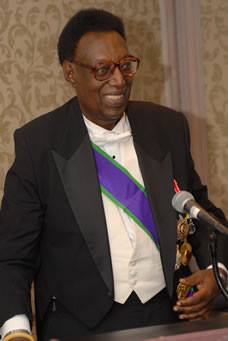The Untold Stories: King Kigeli V A peace lover and peace maker

King Kigeli V Ndahindurwa was a curious amalgam of modern and feudal: Born in 1936 educated in the former prestigious Belgian colonial school of Astrida (Groupe Scolaire Officielle de Butare (GSOB) Indatwa). Although he was overthrown in Belgian led munity in 1959 he still commanded a great respect across the Rwandan society and loved by his people.
A peace lover and maker, even those who overthrew his monarch in 1959 regarded him as a man of peace, he refused to use force in 1970s when the former Ugandan dictator Id Amin told him that they could start a war against Habyarimana and have a breakfast in Kigali.
The Rwandan King without mincing words he told president Id Amin that he cannot shed blood of Rwandans, indeed; it’s an open secret that when the RPF struggle plan was being hatched in Kampala, the King was not informed for fear that he will not be supportive.
Perhaps it was because he was all these things that King Kigeli Ndahindurwa who died this Saturday night at age 80, became the personification of Rwandan nationhood and a unifying factor among Rwandans who have suffered an ethic divide since the overthrow of the Rwandan monarch in 1959.
Indeed, his passing is so troubling to Rwanda at this time where Rwandans are more divided, under fear and intimidation, killed almost on daily basis, faced with hunger and poverty yet singing the praises of their captor Paul Kagame for fear of reprisals.
King Kigeli V Ndahidurwa was an accidental king, placed on the throne at age of 23 after a tumultuous period in which his Brother King Rudahigwa Mutara III died mysterious in Bujumbura after being administered a vaccination drug that many believe was the killer drug planned by the Belgian colonial masters after King Rudahigwa demanded urgent independence.
King Rudahigwa with his political style, master of geopolitics and his remarkable personality which transformed him into a powerful unifying force in a profoundly divided country at the time when Belgians used the ethnic identity they had created to divide and rule.
Although King Kigeli V Ndahindurwa inherited polarized and politically charged country at the time when most African nations were fighting for independence, the Rwandan love and respect for the monarch especially by the poor for whom his brother King Rudahigwa had given land, abolished all forms of obsolete culture and launched hundreds of development projects, the King was a father of all Rwandans irrespective of their ethic background.
But however effective he was in elevating the Unity of Rwandans, it was beyond his power to establish a stable, well-functioning democracy at the time of decolonization because the Belgians were determined to undermine him as they had done to his brother King Rudahigwa and the rest of the Pan -African leaders across the Continent.
The successive governments of Rwanda since independence failed seize this opportunity to return King Kigali V Ndahindurwa forgetting that the King would have been apolitical with limited constitutional powers and be a unifying factor for all Rwandans.
The ascendance to Power by RPF in 1994 after the Genocide of the Tutsis, many believed that King Kigeli V will eventually return home and be accorded constitutional mandate to help broker piece and bring back the lost souls of Rwandans together, but the greed and arrogance of Kagame kept this valuable asset in exile until his death.
Like his predecessor, Kagame also has lost this opportunity; Rwanda is now left in his talons but whether he rules for another 30 years, his departure will leave Rwanda in another conflict that will tear this small nation beyond repair.
The late Gen. Tito of the former Yugoslavia was credited for being a strong leader, yet his strength was personalized but not institutionalized, the death of Gen. Tito in 1980 left Yugoslavia with a mountain of problems and eventually broke into pieces with a high price of that cost lives and property. Rwanda is also just sitting on a time bomb and once a lid is removed it will explode, King Kigeli V is gone, and we don’t know who will succeed him as he didn’t have a known child like his brother King Rudahigwa. But make no mistakeordinary Rwandans often looked to the king to provide the leadership their politicians and generals could never master. All Rwandans will miss him the most.
Jacqueline Umurungi
Brussels
https://inyenyerinews.info/truth-reconciliation/the-untold-stories-king-kigeli-v-a-peace-lover-and-peace-maker/https://i0.wp.com/inyenyerinews.info/wp-content/uploads/2016/10/kigeli-1.jpg?fit=463%2C330&ssl=1https://i0.wp.com/inyenyerinews.info/wp-content/uploads/2016/10/kigeli-1.jpg?resize=140%2C140&ssl=1AFRICADEMOCRACY & FREEDOMSHUMAN RIGHTSJUSTICE AND RECONCILIATIONLATEST NEWSTRUTH & RECONCILIATIONWORLDKing Kigeli V Ndahindurwa was a curious amalgam of modern and feudal: Born in 1936 educated in the former prestigious Belgian colonial school of Astrida (Groupe Scolaire Officielle de Butare (GSOB) Indatwa). Although he was overthrown in Belgian led munity in 1959 he still commanded a great respect across...Placide KayitareNoble
Mararakayitare@gmail.comAdministratorINYENYERI NEWS



